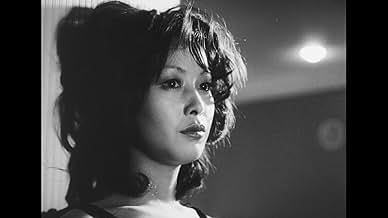AVALIAÇÃO DA IMDb
6,2/10
1,1 mil
SUA AVALIAÇÃO
Adicionar um enredo no seu idiomaA revolutionary faction steals some hand bombs. While escaping, several soldiers are killed. The movement's highest authority deems October unfit and sends the leader of another faction to t... Ler tudoA revolutionary faction steals some hand bombs. While escaping, several soldiers are killed. The movement's highest authority deems October unfit and sends the leader of another faction to take the remaining bombs.A revolutionary faction steals some hand bombs. While escaping, several soldiers are killed. The movement's highest authority deems October unfit and sends the leader of another faction to take the remaining bombs.
Avaliações em destaque
As I write, no one on IMDb has provided a synopsis for Ecstasy of the Angels, and the few reviews here are rather bereft of plot details; could that be because no-one who has watched it has got a clue what was going on thanks to the stupefyingly dull direction, the coma-inducing performances, and the fact that it is virtually impossible to tell one character from another? I reckon so.
Before I gave up trying to follow the story and began praying for the film to just finish and thereby end my misery (I'm obsessive about watching a film in its entirety, no matter how bad), here's what I garnered about the plot: The Four Seasons revolutionary group is split into factions that go by the names of— surprise surprise—the Four Seasons. Fall organises a raid on a US army base and makes off with some high explosives (stored in what looks like Bilbo Baggins' hobbit hole), but with members of her team killed and injured during the job, the way is left wide open for the other factions to help themselves to the spoils of her venture. Cue much arguing amongst angry freedom fighter types, and lots of strangely unemotional sex scenes between the uniformly hot female members of the group and the seemingly unappreciative blokes.
If I had known what I was in for, I would have passed on this film, but for some reason I had got it into my mind that this was a sleazy Cat III effort from Hong Kong; not only did I get the country of origin wrong—this is a Japanese flick—but I also was also severely misguided when it came to the kind of film this was. Rather than a trashy piece of Asian filth, Ecstasy of the Angels is a pompous, pretentious, and extremely dull avant-garde art-house film that could only possibly appeal to the bearded chin-stroker contingent; whilst they might enjoy waxing lyrical about the intent of the piece, the film's political message or the pointless techniques employed by the director (B&W to colour to B&W to colour, ad nauseum), anyone else will simply be bored rigid. Hell, I was practically catatonic by the end of the film's opening scene in which several of the characters sit around a table in a night-club while a singer drones on endlessly in the background.
Before I gave up trying to follow the story and began praying for the film to just finish and thereby end my misery (I'm obsessive about watching a film in its entirety, no matter how bad), here's what I garnered about the plot: The Four Seasons revolutionary group is split into factions that go by the names of— surprise surprise—the Four Seasons. Fall organises a raid on a US army base and makes off with some high explosives (stored in what looks like Bilbo Baggins' hobbit hole), but with members of her team killed and injured during the job, the way is left wide open for the other factions to help themselves to the spoils of her venture. Cue much arguing amongst angry freedom fighter types, and lots of strangely unemotional sex scenes between the uniformly hot female members of the group and the seemingly unappreciative blokes.
If I had known what I was in for, I would have passed on this film, but for some reason I had got it into my mind that this was a sleazy Cat III effort from Hong Kong; not only did I get the country of origin wrong—this is a Japanese flick—but I also was also severely misguided when it came to the kind of film this was. Rather than a trashy piece of Asian filth, Ecstasy of the Angels is a pompous, pretentious, and extremely dull avant-garde art-house film that could only possibly appeal to the bearded chin-stroker contingent; whilst they might enjoy waxing lyrical about the intent of the piece, the film's political message or the pointless techniques employed by the director (B&W to colour to B&W to colour, ad nauseum), anyone else will simply be bored rigid. Hell, I was practically catatonic by the end of the film's opening scene in which several of the characters sit around a table in a night-club while a singer drones on endlessly in the background.
A bunch of young Japanese terrorists named after weekdays follow the orders of a terrorist named after a month: October. They steal some boxes of bombs from a US Army warehouse (the sign in the movie actually says: weapon wearhouse). They are found by two US soldiers. There's a shooting. A bomb explodes in October's face. He is blinded but alive. That is the opening scene of the movie, after that the plot is quite thin for the rest the "story".
The style of the movie is similar to Jean Luc Godard's early films but Koji Wakamatsu makes a film that has the actors reciting political slogans all throughout with random scenes of sex and violence. I am actually not sure if it was meant to be a serious film, but I actually found it quite funny and I enjoyed it as a Z grade pseudo philosophical porn terrorist comedy.
Ecstasy of the Angels is definitely not a great film but it was interesting and funny.
The style of the movie is similar to Jean Luc Godard's early films but Koji Wakamatsu makes a film that has the actors reciting political slogans all throughout with random scenes of sex and violence. I am actually not sure if it was meant to be a serious film, but I actually found it quite funny and I enjoyed it as a Z grade pseudo philosophical porn terrorist comedy.
Ecstasy of the Angels is definitely not a great film but it was interesting and funny.
I watched this film, with very little knowledge of Koji Wakamatsu and his films. I had recently seen "Dare to Stop Us" a film about Wakamatsu through the eyes of his assistant. Actually, it was through that film that I became more interested in his work. Fortunately, a museum where I live was doing a small retrospective that included Ecstasy of Angels.
I really didn't know what to expect, and having seen "Dare to Stop Us" I was expecting a micro-budget affair and very amateur performances. My experience was the exact opposite. Wakamatsu definitely knew how to make films and I was pleasantly surprised by the performances. I really enjoyed Ecstasy of Angels.
A brief summary of the film; a group of radical activists soon turn on one another after stealing a large amount of explosives from a US Army base. The characters have unusual names such as Monday and October, and the sects themselves are named after the seasons. I wasn't able to actually follow who was who by their names, however, but each character was distinctive enough that I could follow what was going on.
That is essentially the plot of Ecstasy of Angels. We watch the different radical groups fall apart and turn on each other. It's a study of power dynamics. What made me so fascinated with this film, is how well paced Wakamatsu was able to deliver the plot. I was never bored. He does some interesting things shifting back and forth from black and white and color. The film also contains a fair amount of sex and nudity. However, the sex is simulated, and other then women's breasts you really don't see anything too graphic, especially by today's standards.
Ecstasy of Angels is very much an art film and it is low budget. I think fans of Wakamatsu and early 60s Japanese filmmaking would enjoy this film. I'm not sure the average movie-goer would however. In fact, in an auditorium of about 40 people, around 10 people left during the film. Not exactly a ringing endorsement. But I'm endorsing it, I liked it from beginning to end and maybe you will too.
Give Ecstasy of Angels a chance and see it if you ever get the opportunity.
I really didn't know what to expect, and having seen "Dare to Stop Us" I was expecting a micro-budget affair and very amateur performances. My experience was the exact opposite. Wakamatsu definitely knew how to make films and I was pleasantly surprised by the performances. I really enjoyed Ecstasy of Angels.
A brief summary of the film; a group of radical activists soon turn on one another after stealing a large amount of explosives from a US Army base. The characters have unusual names such as Monday and October, and the sects themselves are named after the seasons. I wasn't able to actually follow who was who by their names, however, but each character was distinctive enough that I could follow what was going on.
That is essentially the plot of Ecstasy of Angels. We watch the different radical groups fall apart and turn on each other. It's a study of power dynamics. What made me so fascinated with this film, is how well paced Wakamatsu was able to deliver the plot. I was never bored. He does some interesting things shifting back and forth from black and white and color. The film also contains a fair amount of sex and nudity. However, the sex is simulated, and other then women's breasts you really don't see anything too graphic, especially by today's standards.
Ecstasy of Angels is very much an art film and it is low budget. I think fans of Wakamatsu and early 60s Japanese filmmaking would enjoy this film. I'm not sure the average movie-goer would however. In fact, in an auditorium of about 40 people, around 10 people left during the film. Not exactly a ringing endorsement. But I'm endorsing it, I liked it from beginning to end and maybe you will too.
Give Ecstasy of Angels a chance and see it if you ever get the opportunity.
Koji Wakamatsu's treatment of this story is, compared to big budget filming, what guerilla warfare is to a full blown World War. Imagine seeing a hysterical comedy about idealistic terrorists betrayed by their leaders as written by Jean-Luc Godard, produced by David Lynch and directed by Gregg Araki: that gets you somewhere in the neighbourhood of what this picture is like. Untroubled by storytelling conventions Wakamatsu lets the thin thread that holds all scenes more or less together snap halfway through the film. His scenes of bloodcurdling violence are thrown at you with the gusto of a rabid modern painter. Visually brilliant and wonderfully over the top with some poignantly funny touches, this ranks as one of the most enthralling political nightmares ever printed on celluloid.
This is an excellent film, flawed in the sense that certain aspects of the fictional revolutionary group appear quite caricatured at times but viewed in relation with director Koji Wakamatsu's newest film "United Red Army" it can be seen to draw a surprisingly accurate picture of the revolutionary nihilism of the Japanese student activists of the time. Other reviewers have compared the film to Godard's early work such as La Chinoise and admittedly the artistic style is quite similar though less refined, and far from being less politically aware than Godard, Wakamatsu was actually much more realistically cynical in his portrait of armed student activist cells whereas Godard's revolutionary themed films displayed a certain hopeful naiveté in the potential of a largely dogmatic and authoritarian movement which was strongly criticized by his contemporaries in the Situationist International. The writer of this film Masao Adachi was certainly not a pretentious intellectual out to exploit sex and revolutionary pop aesthetic as some critics have inferred here; a closer look at his personal history shows that shortly after writing the screenplay he actually moved to Lebanon to join the real life armed revolutionary group the Japanese Red Army where he remained a committed activist for 28 years up until his arrest in the year 2000. As such the film can be a unique and telling account of his own mentality and the personal motivations which led to joining the JRA, as well as his prior knowledge of the less-than-ideal dynamics of the lifestyle he would be choosing. One must keep in mind that at the time Wakamatsu was expected by producers to be making films in the 'pink' genre which would explain the gratuitous sex scenes that could be seen as offensive or pointless to some but the unique beauty of the film far outweigh it's occasional rough edges. Highly recommended, though not for casual viewers of film "for entertainment's sake" alone.
Você sabia?
- CuriosidadesThis film was released in a time of violent social turmoil for Japan. ATG, the film's distributor, got cold feet when a rash of Christmas tree bombing, similar to the one in the movie, started to plague the streets of Tokyo. The film was quickly withdrawn from distribution and briefly re-released in the art theater circuit.
- Erros de gravaçãoWhile the revolutionaries enter the base, a sign reading "weapon wearhouse" instead of "weapon warehouse" is clearly visible for several seconds.
- ConexõesEdited into Gli ultimi giorni dell'umanità (2022)
Principais escolhas
Faça login para avaliar e ver a lista de recomendações personalizadas
- How long is Ecstasy of the Angels?Fornecido pela Alexa
Detalhes
Bilheteria
- Faturamento bruto mundial
- US$ 585
- Tempo de duração1 hora 29 minutos
- Cor
- Mixagem de som
- Proporção
- 2.35 : 1
Contribua para esta página
Sugerir uma alteração ou adicionar conteúdo ausente

Principal brecha
By what name was Tenshi no kôkotsu (1972) officially released in Canada in English?
Responda

















